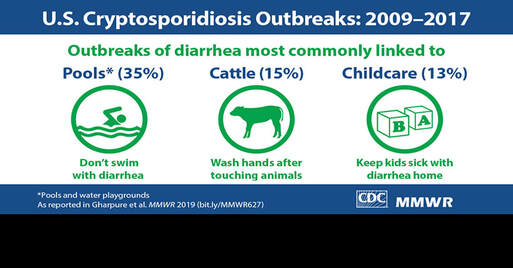Cryptosporidium
We want to be very upfront that the Bull Run Water supply must meet the federal mandate (LT2 Rule) to treat for cryptosporidium. In fact, we advocate for either of two proven solutions - UV or a double protection treatment method using UV and Ozone, similar to what Seattle does with their Cedar River treatment facility.
We just don't believe spending over a BILLION dollars, adding lots of complex chemicals to the water, waste in our landfills, and saddling the consumer with outrageous water rates is the way to do it. There is a better, faster, more environmentally friendly way.
We just don't believe spending over a BILLION dollars, adding lots of complex chemicals to the water, waste in our landfills, and saddling the consumer with outrageous water rates is the way to do it. There is a better, faster, more environmentally friendly way.

What is cryptosporidium?
Cryptosporidium is a single cell parasite species which is typically found in the feces of cattle and other farm animals. It lives in the gastrointestinal lining of its host and is spread through their bowel movements. While there are many variants of crypto, only two of the species types are known to affect humans.
Crypto is primarily spread by ingesting water from feces-contaminated water sources such as recreational water (swimming pools are the leading source) and waterways that are exposed to livestock and the public.
While cryptosporidium is a health hazard, it is worth noting that the Bull Run Watershed is a federally protected environment without access to the public, cattle, and other livestock. As a result, the detections of crypto in the Bull Run Watershed are few and the risk is very low. The remarkable resource of the Bull Run Water system has operated for over 100 years without protection for crypto, and the extremely low risk is why Portland was originally given a variance from the EPA rule.
Additional Informational Links
Center for Disease Control: Parasites - Cryptosporidium
U.S. National Library: History of Cryptosporidium
Center for Disease Control: Parasite Biology and Life Cycle
Cryptosporidium is a single cell parasite species which is typically found in the feces of cattle and other farm animals. It lives in the gastrointestinal lining of its host and is spread through their bowel movements. While there are many variants of crypto, only two of the species types are known to affect humans.
Crypto is primarily spread by ingesting water from feces-contaminated water sources such as recreational water (swimming pools are the leading source) and waterways that are exposed to livestock and the public.
While cryptosporidium is a health hazard, it is worth noting that the Bull Run Watershed is a federally protected environment without access to the public, cattle, and other livestock. As a result, the detections of crypto in the Bull Run Watershed are few and the risk is very low. The remarkable resource of the Bull Run Water system has operated for over 100 years without protection for crypto, and the extremely low risk is why Portland was originally given a variance from the EPA rule.
Additional Informational Links
Center for Disease Control: Parasites - Cryptosporidium
U.S. National Library: History of Cryptosporidium
Center for Disease Control: Parasite Biology and Life Cycle

